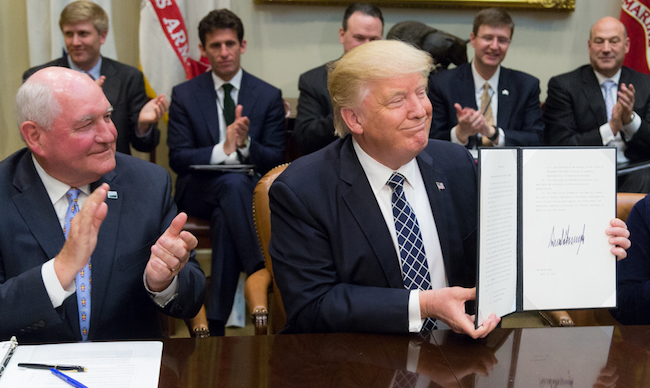
The Recently Proposed GMO Rule Change at the USDA is of Grave and Immediate Concern, Not President Trump’s Executive Order
(USDA Secretary Sonny Perdue, to the left of President Trump. Photo courtesy of The White House.)
Last week, President Trump received a tremendous amount of attention for signing an executive order directing the USDA, FDA and EPA to make it easier for genetically-engineering plants and animals to enter the food supply.
At face value, this seemed to be an ominous development. Yet, industry observers were not particularly impressed.
“His executive order was the equivalent of sound and fury, signifying nothing. It was merely propaganda for the biotech industry,” said George Kimbrell, Legal Director at the Center for Food Safety.
However, what should be alarming organic advocates right now is the recent action taken by the USDA nearly a week before the president’s executive order, something curiously absent from the USDA’s own press release page.
On June 6th, the USDA entered into the Federal Register a proposal to change the way that GMOs are regulated. While there are several elements to this proposed rule, there are two critical aspects:
1) In many cases, companies will now be able to self-determine whether their GMOs are a plant pest (a plant pest is anything that can injure, infect or damage any plants or plant products). If they do not pose a plant pest risk, these GMOs will be excluded from government regulation.
“Not only will this proposed rule lessen the way that GE-crops are reviewed, but it will lead to more GE-contamination of organic crops and more pesticides unleashed into the environment,” added George Kimbrell.
“This is all part of the strong deregulatory stance of this administration, which wants to take safety assessments away from the government and put it in the hands of the companies,” said Michael Hansen, PhD, Senior Staff Scientist – Advocacy for Consumer Reports.
To understand how this could play out, all one has to do is look at Boeing.
After two recent crashes, it was uncovered that Federal Aviation Administration (FAA) managers pushed the agency’s safety engineers to delegate safety assessments to Boeing itself. Several technical experts inside the FAA said that it was “inappropriate for Boeing employees to have so much authority over safety analyses of Boeing jets.”
Even though we now have tangible proof as to how dangerous this hands-off approach can be, the USDA wants to abdicate its inherent responsibility for protecting the safety of our food supply, placing it in the hands of corporations.
2) Because this proposed rule is focused on whether a GMO presents a plant-pest risk — instead of whether it merely contains bacteria from a plant-pest — this opens the door for GE-plants that produce pharmaceutical and industrial compounds (GE-proteins extracted from these plants) to be unregulated.
“While these GE drug producing-plants may not be plant pests, they could have an enormous adverse public health impact. What happens if GE-corn that produces insulin contaminates a nearby corn field and ends up in a box of cereal? The USDA has acknowledged that potential problems could emerge but is not proposing any oversight,” said Michael Hansen.
In the past, there has been significant backlash against GE-pharmaceutical and industrial crops, even from major food companies.
In 2003, Kraft Co-CEO Betsy Holden called for stricter rules for planting crops that are bioengineered to produce pharmaceuticals, calling them a threat to the food supply.
COMING TOGETHER?
While organic and conventional food companies have not historically been on the same page when it comes to GMOs, the USDA’s proposed set of rules might bring them together.
Geoff Freeman, who took the helm of the Grocery Manufacturers Association last August, said that his organization “will stand as a champion for smart regulation.” He now has the opportunity to prove this.
“If this regulation is adopted, new GMOs will flood the market without the oversight necessary to protect consumers, public health or the environment. There is a very strong chance that consumers and the food supply will suffer irreparable harm, all with the goal of bolstering the profits of the chemical and biotech industries,” said Kim Richman, Founding Partner at Richman Law Group.
The USDA is accepting comments to this proposed rule until August 8th (you can leave one by clicking HERE), and Organic Insider will be notifying its readers in the weeks ahead about email petitions and campaigns to stop this rule from going into effect.
If you’d like to share this story on social media, you can use this link: https://organicinsider.com/newsletter/trump-ease-gmo-approvals-usda-your-weekly-organic-insider
—
Last week in Organic Insider, we broke the story of CEO Sheryl O’Loughlin stepping down from REBBL, a company she led for the past four years.
In the most recent episode of The Living Maxwell Podcast, I sat down with Sheryl and we had a wide-ranging conversation, where she discussed why she left REBBL, how the company was started, REBBL’s Brazil nut project in Latin America, and how she overcame some serious personal struggles.
Sheryl also went into detail about a very difficult — and controversial — decision that she made early on in her tenure as CEO, which ended up changing the trajectory of the company.
At the very end of our interview, I share a story with Sheryl that she had never heard before, and it was one where her act of kindness touched me in a profound way. To be honest, I got pretty choked up while recounting this.
Click HERE to listen and learn more. Or, you can also find this episode on iTunes, Stitcher, Spotify, TuneIn and Google Play.
Please enjoy!

 |
With gratitude, 
Max Goldberg, Founder |
Quick Hits
* Clif Bar and KIND are going at it again on social media.
* At the 1 Hotel Central Park in New York City, guests can enjoy 100% organic cotton linens and mattresses.
* Jason Karp, the chairman/co-founder of Hu Kitchen and founder/CEO of HumanCo, discusses how he was going blind but reversed it through nutrition.
* Pak Group has introduced an organic bread softener that has been shown to extend shelf life, save on costs and enhance bread quality.
* Organic Farmers Association announced its 2019 policy platform.
* Under pressure from human rights groups, Costco has ceased ordering from the Honduran operations of Fyffes, where labor rights violations have occurred.
* Hard-to-find organic padrón peppers are now for sale at Hudson Yards in NYC.
New Organic Products
Whole Veggie Sticks by ZENB
ZENB organic veggie sticks are the first-to-market in corn, beet and red bell pepper flavors that utilize the cob, peel, stem and seeds. ZENB earned its name from the Japanese word “zenbu,” meaning “whole.”
Cold-Pressed Lemon Water by Lemon Perfect
Launched last year in California, Lemon Perfect’s organic cold-pressed lemon waters contain zero sugar and come in four flavors — just lemon, blueberry acai, dragon fruit mango and peach raspberry. These drinks just became available in the NYC market.
Grass-Fed Macaroni and Cheese by Good Citizens
Good Citizens has announced the launch of two new products — organic grass-fed macaroni & cheese and organic grass-fed shells & white cheddar. They are available at Whole Foods stores nationwide.
Want your product profiled here? Learn more
Weekly News Summaries
Project Juice and Beaming Have Merged
In an announcement made yesterday, California-based organic juice bars Project Juice and Beaming have merged.

Pipeline Construction is Harmful to Organic Farms
By Amy Mall
The construction of pipelines has been known to impact the environment and surrounding communities, and now there is evidence that organic farms are particularly vulnerable.

Study: 3 out of 4 Want to Buy Organic......But
By John Anderer
According to a new survey of 2,000 Americans, 55% of the respondents feel that maintaining a healthy diet is unaffordable.

USDA: Organic Operations Grew by 4.4%
It was just reported that the total number of USDA certified organic operations in 2018 was slightly above 43,000, up 4.4% from 2017.

Danish Supermarkets Aiming for 30% Organic by 2030
For a country that understands the importance and growth of organic, Denmark believes that its supermarkets could be 30% organic by the end of the next decade. Amazing.

The Insect Population Continues its Frightening Decline
By Barclay Ballard
Given their significance to the planet's ecological health, insects are disappearing at an unprecedented rate, sure to be devastating for all.

Impossible Foods Sparks Controversy Once Again
By Nicole Rasul
Impossible Foods, which uses glyphosate-sprayed, GMO-soy in its Impossible Burgers, sees "regenerative grazers as one of the worst environmental options" -- even though studies have completely disproven this.

Maple Hill Creamery founder: Stop Pitting Plant-Based vs Animal Agriculture
By Elaine Watson
Maple Hill Creamery CEO Tim Joseph makes the case that multiple farming systems will co-exist in the future.

Is Andean Lupin the Next Big Superfood?
By Mary Ellen Shoup
One company is betting that Andean Lupin, a nutritionally-dense legume, will be the next big superfood.
The material in this newsletter is copyrighted and may be reprinted by permission only. All requests must be in writing. Please use our contact form to request republication rights.
Newsletter Archive
Quick Hits
* Clif Bar and KIND are going at it again on social media.
* At the 1 Hotel Central Park in New York City, guests can enjoy 100% organic cotton linens and mattresses.
* Jason Karp, the chairman/co-founder of Hu Kitchen and founder/CEO of HumanCo, discusses how he was going blind but reversed it through nutrition.
* Pak Group has introduced an organic bread softener that has been shown to extend shelf life, save on costs and enhance bread quality.
* Organic Farmers Association announced its 2019 policy platform.
* Under pressure from human rights groups, Costco has ceased ordering from the Honduran operations of Fyffes, where labor rights violations have occurred.
* Hard-to-find organic padrón peppers are now for sale at Hudson Yards in NYC.



